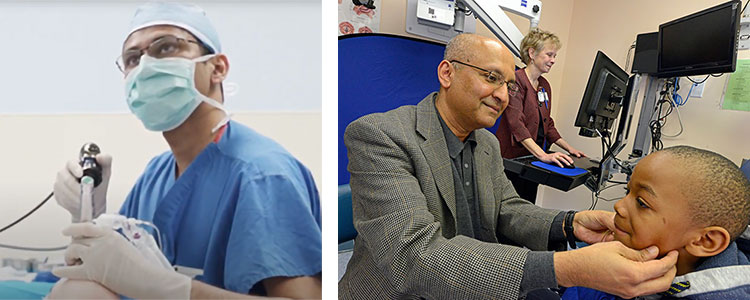Signs That It's Time to See a Voice Specialist
Signs That It's Time to See a Voice Specialist
Blog Article
Checking out the Area of Otolaryngology: What to Expect When You Get In Touch With an ENT
Otolaryngology, typically referred to as ENT, encompasses the medical diagnosis and treatment of throat, ear, and nose disorders. For those experiencing related issues, speaking with an ENT professional can offer clarity and alleviation. Recognizing what to expect throughout such assessments is crucial for effective communication and treatment. This review will certainly describe essential elements of the ENT experience, including common factors for check outs and the processes associated with medical diagnosis and treatment.

Comprehending Otolaryngology: An Overview
Otolaryngology, frequently referred to as ENT (Throat, nose, and ear) medication, is a customized branch of medication that concentrates on the diagnosis and treatment of conditions influencing these crucial locations of the body. This area incorporates a vast array of disorders, consisting of those pertaining to hearing, balance, breathing feature, and speech. Otolaryngologists are educated to take care of both medical and clinical therapies, utilizing advanced techniques and modern technologies. Their knowledge expands past typical disorders, resolving problems such as allergic reactions, sinus infections, and hearing loss. In addition, they play a vital duty in the management of head and neck cancers, offering complete treatment tailored to individual person requirements. On the whole, otolaryngology stays necessary for maintaining health and wellness and lifestyle in affected people.
Typical Reasons to See an ENT Specialist
Several individuals seek the knowledge of an ENT expert for a selection of reasons, reflecting the varied nature of problems that impact the ear, nose, and throat. Common concerns consist of persistent sinusitis, which frequently results in consistent nasal blockage and face discomfort. Allergic reactions and their associated signs, such as sneezing and itching, additionally prompt visits to these professionals (Sinus). Hearing loss, whether abrupt or progressive, is an additional substantial factor for examination. Additionally, people might seek evaluation for throat disorders, including consistent hoarseness or ingesting troubles. Sleep apnea, identified by disturbed breathing throughout sleep, is regularly attended to by ENT specialists also. Each of these problems highlights the significance of specialized treatment in handling complicated ENT-related wellness problems
Planning for Your ENT Appointment
When getting ready for an ENT visit, it is crucial to gather appropriate details and consider any kind of particular concerns. Individuals need to assemble an in-depth clinical history, including previous ear, nose, or throat concerns, surgeries, and existing medications. Documenting signs-- such as duration, extent, and frequency-- can offer useful understandings for the ENT expert. Additionally, people must prepare a list of concerns they desire to ask, making certain that all concerns are addressed throughout the browse through. Bringing along any relevant medical records or test outcomes can further help the ENT in understanding the person's condition. Finally, individuals ought to confirm their consultation details, including time, area, and day, to decrease any last-minute confusion. Proper prep work can enhance the efficiency of the assessment and bring about better outcomes.
What to Expect Throughout the Consultation
As the examination begins, the patient can expect to take part in an extensive conversation with the ENT expert regarding their signs and symptoms and clinical history. The professional will ask about the period, regularity, and seriousness of signs and symptoms such as hearing loss, nasal blockage, or aching throat. In addition, the client's previous clinical problems, medications, and any type of relevant household background will be examined, aiding the expert in creating a full understanding of the client's health. The ENT may likewise ask about way of living aspects, such as direct exposure to irritants or irritants. This open dialogue establishes a structure for the examination, guaranteeing that the client's worries are dealt with and establishing the phase for any essential assessments or referrals for treatment.
Diagnostic Examinations and Procedures in Otolaryngology
A range of analysis examinations and treatments are crucial in otolaryngology to precisely evaluate and identify conditions impacting the nose, throat, and ear. Common tests include audiometry, which measures hearing function, and tympanometry, evaluating middle ear pressure. Nasal endoscopy enables visualization of the nasal flows and sinuses, while laryngoscopy analyzes the throat and singing cords. Imaging methods, such as CT scans and MRIs, supply comprehensive sights of head and neck frameworks. Allergic reaction testing may additionally be performed to recognize triggers for sinus or breathing concerns. These diagnostic tools make it possible for ENT specialists to create a complete understanding of patients' conditions, ensuring tailored and effective monitoring strategies. Proper diagnosis is vital for effective therapy end results in otolaryngology.
Treatment Options Supplied by ENT Specialists
ENT professionals supply a selection of therapy choices customized to resolve particular conditions impacting the throat, nose, and ear. These treatments vary from traditional methods, such as medication and lifestyle alterations, to even more invasive procedures. As an example, allergies may be handled with antihistamines or immunotherapy, while persistent sinusitis could call for nasal corticosteroids or sinus surgical procedure. For hearing loss, ENT experts usually suggest listening device or surgical interventions like cochlear implants. In instances of throat conditions, choices can consist of speech therapy or procedures to eliminate obstructions. In addition, they may give guidance for handling sleep apnea, including the usage of CPAP gadgets or surgical treatments. Overall, the objective is to enhance people' top quality of life with personalized treatment and efficient treatment strategies.
When to Look For Follow-Up Care With an ENT
When to look for follow-up treatment with an ENT specialist is crucial for managing continuous symptoms or issues associated to ear, nose, and throat conditions, identifying. People must consider arranging a follow-up appointment if symptoms continue in spite of first treatment, such as persistent ear discomfort, nasal congestion, or throat pain. Adjustments in hearing, equilibrium issues, or uncommon nasal discharge might likewise call for more examination. In addition, if a client experiences side impacts conductive hearing from suggested medicines or has undergone an operation, follow-up care is essential to keep track of healing and attend to any kind of concerns. Prompt assessments can guarantee reliable monitoring of problems, stop possible difficulties, and supply peace of mind relating to one's wellness. Looking for follow-up care promotes positive health administration in otolaryngology.
Often Asked Concerns

What Qualifications Should I Search for in an ENT Professional?
When seeking an ENT expert, one must seek board qualification, relevant experience, and solid individual testimonials. In addition, reliable communication skills and a caring method can significantly improve the overall therapy experience.
How Do I Select the Right ENT for My Requirements?
Picking the right ENT professional includes reviewing their certifications, experience, and patient evaluations (ENT Doctor). It is important to contemplate their interaction design and approach to therapy, guaranteeing they line up with the individual's certain health demands and preferences
Are There Any Kind Of Risks Connected With ENT Procedures?
The risks related to ENT treatments might include infection, blood loss, anesthetic problems, and potential damages to surrounding frameworks. People should talk about these dangers with their physician to recognize individual worries and assurance informed decisions.
Just How Can I Manage Anxiety Before My ENT Appointment?
To handle anxiousness prior to a visit, people can exercise deep breathing exercises, picture positive end results, prepare inquiries in breakthrough, and seek support from friends or household, promoting a feeling of confidence and calmness.
What Should I Do if I Experience Negative Effects From Therapy?
The person needs to immediately report them to their healthcare copyright if side impacts from therapy take place. Changes to therapy or extra interventions may be necessary to guarantee safety and security and efficiency in handling their condition - Otolaryngologist. As the examination starts, the patient can expect to involve in a thorough conversation with the ENT expert concerning their signs and symptoms and medical history. These diagnostic devices allow ENT experts to create a complete understanding of patients' problems, making sure tailored and efficient administration plans. ENT professionals offer a selection of treatment choices customized to attend to particular conditions affecting the ear, nose, and throat. When seeking an ENT expert, one should look for board accreditation, pertinent experience, and solid person evaluations. Selecting the ideal ENT expert includes evaluating their credentials, experience, and client evaluations
Report this page